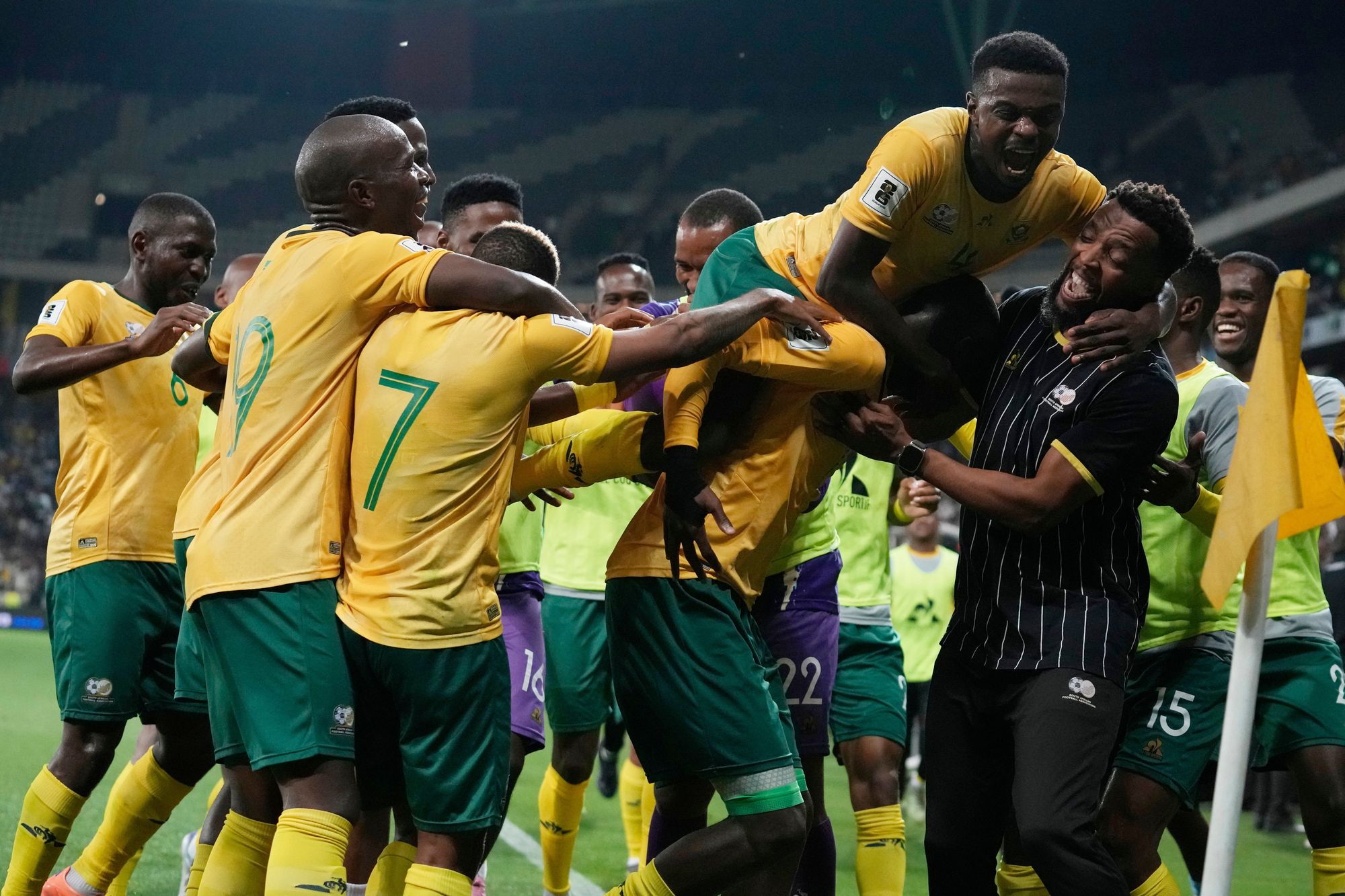

SPORTS
Unraveling the Shocking Domino Effect: How Man City’s 100+ Charges May Finally Face Verdict!
Published
3 weeks agoon
By
OBS
Across the Premier League, senior figures are now bracing themselves, amid growing murmurs that the Manchester City decision is expected “this month”. Many everyday employees at the club are understood to have become inured to the prospect, since it’s been hanging over them for so long – far longer than expected.
It says much that people in the game have started to refer to the collapse of the Chinese espionage trial, and wonder whether there will be government involvement given the geopolitical dimensions through the club’s Abu Dhabi ownership.
And yet for all that “115” – or “129/130”, as it’s become known in football circles – has been seen as an existential moment for modern English football because of the height of its stakes, there is now a belief that its actual impact could be significantly lessened in terms of regulatory effect – if not necessarily sensational headlines.
That is due to the parallel associated party transaction (APT) case, which finally ended in a settlement between City and the Premier League.
Such a sentiment may come as a surprise given how muted the reaction to that announcement was in early September, particularly in contrast to the cacophony of noise the case had previously created. There was certainly no information war, as had been seen with previous developments in the story, including the initial rules being declared unlawful exactly a year ago. The feeling was that the settlement just represented a lull before “the big one”, or potentially a badly needed entente. The release of identical statements pointed to the latter, amid a sense that many are fatigued by constant battle, and a will to “draw a line under brand-damaging litigation”.
The Independent understands that the APT settlement may even represent an end in itself, especially in how it’s seen as safeguarding a crucial part of the financial rules. This is why the impact of the City case may be lessened with regard to regulation. Or, as has been put within the Premier League, “115 looks to the past, APT is about the future”.
The APT dispute was ultimately about the fear of other clubs that new rules were required to address the growing challenges of state ownership, and particularly the distinctive nature of “associated parties” in autocracies where the lines are blurred between public and private. In other words, a relatively local company could be instructed to do a deal of international dimensions with a state-owned club. The company wouldn’t have any need for such promotion, and most normal ownerships – even capitalist funds – don’t have such capabilities.
Since such money often comes from the same pot, which is sovereign wealth, many football executives believe it should be counted as equity anyway – ie, revenue that would not raise PSR restraints. The fear was that this would be an indirect way for states to drastically increase their spending power.
The new APT rules were implemented in order to foster a degree of control over this and properly link revenue to expenditure, to prevent extreme inflation and preserve competitive balance.
The latest version of these rules, agreed earlier this year, is now understood to be locked in place. That comes after long and arduous negotiations, albeit amid a sense on all sides that it was probably time for the temperature to come down on much of this.
The entire episode did reach some peaks that appeared to illustrate the full range of issues that come with state ownership. City would naturally point to justified grievances, right up to how the initial rules were declared unlawful. Other clubs believe they took the APT case primarily because they wanted “a win” before “115”. They pointed to how City’s claim homed in on shareholder loans, despite having previously had no complaint about that issue at all.

Either way, the case left open the possibility that the entire concept of APT could be scrapped, while leaving the Premier League open to costly compensation claims over obstructed deals. In other words, chaos and further “lawfare” amid an atmosphere of increasing animosity in English football.
The case was already seen as a landmark representing the first time a Premier League club had challenged the competition’s founding premise of a partnership that accepted majority votes for all regulatory decisions. The aggressive attitude of City’s representatives in meetings only accentuated this.
It was because of all that the Premier League was ultimately convinced to dig in and not budge on these rules. A core principle of the competition was preserved, chaos avoided.
A major strategy point for the Premier League right now, for the competition’s part, is preserving a currently vibrant competitive balance – given this is seen as the key advantage held over every major league.
Most of the noise comes from those who argue the rules aren’t fair. The Premier League may now lack that kind of voice in the opposite direction.
Duly, the settlement negotiations are understood to have been painstaking and complex – but ultimately successful.
There is now a strong confidence from within the Premier League that state or state-linked ownerships will not be able to test regulations with mega deals. That settlement has still provoked debate over what it could mean for “the big one”, particularly since they are expected to come in close conjunction, the next – potentially – this October.

The answer, in principle, is nothing; “115” is an entirely separate judicial process, where everyone working on it has been “locked away” throughout. Clifford Chance’s lawyers representing City, for example, have essentially been bunkered away with those from the club.
One process has no impact on the other. City, meanwhile, insist on their innocence.
The wider case has nevertheless had other effects, since it’s widely seen as having caused clubs to delay big decisions. The competition has recently found itself at an impasse on several major issues due to disparate voting blocs. This has been visible through the failure to push through a version of Uefa’s squad cost ratio, as well as potential innovations like “anchoring” – meaning that the wealthiest clubs can only spend a multiplier of the poorest clubs’ revenue.
Such hesitation has been put down to the potential for the City case to blow up everything again. The Premier League still has a lot of uncertainty around future financial rules. On the City side, some companies are even known to have been put off potential deals because the case is dragging on.
Underneath all of that, a core protection within the rules has been locked in place. This is no small thing, even as everyone now waits for “the big one”.
You may like
-
Naira Plummets for the Third Day in a Row: Shocking New Exchange Rate Hits N1,473.29/$!
-


Shocking Recall: Grocery Store Taco Kits Contain Hot Chocolate Packets!
-


Young Republicans Caught in Racist Group Chat Resign Following Shocking Revelations
-


Shocking Arrests: Four Charged in Murder of Osun Local Government Chair – What You Need to Know!
-


Lagos Pushes Back: Shocking Rejection of National Assembly’s Central Gaming Bill!
-


Shocking Revelations: Jonathan’s Fierce Attack on Successor for Neglected Bayelsa Projects!
SPORTS
South Africa’s Stunning Comeback: First World Cup Qualifying in 16 Years! Can Nigeria Snatch a Last-Minute Playoff Chance?
Published
2 weeks agoon
October 16, 2025By
OBS
South Africa have qualified for their first World Cup since hosting the tournament 16 years ago, although they had Nigeria partially to thank for their progress.
South Africa beat Rwanda 3-0 in Nelspruit to finish first in Group C as Benin, who had a two-point lead going into the final round of fixtures, tumbled from top place to third in the standings after being thumped 4-0 by Nigeria in Uyo.
Victor Osimhen grabbed a hat-trick to keep Nigeria’s hopes alive as they seek to advance to a playoff next month for the four best runners-up from the nine African qualifying groups.
South Africa finished on 18 points, with Nigeria runners-up ahead of Benin on goal difference as both ended with 17 points.

South Africa had three points deducted last month after being found guilty of fielding a suspended player in an earlier qualifier in March, a mistake they admitted.
But that will be largely forgotten now as South Africa qualified for the first time since they hosted the finals in 2010.
Thalente Mbatha scored after five minutes, and Oswin Appollis netted the second in the 21st minute to put South Africa on their way. Striker Evidence Makgopa made it 3-0 in the 72nd minute with a header from a corner.
For Nigeria, Osimhen opened his account in the third minute from Samuel Chukwueze’s through pass and the same player then crossed for the striker to head home a second in the 37th minute.
He completed his hat-trick soon after halftime, heading home a chipped pass from Moses Simon, but the best goal was the last — thrashed in on the volley by Frank Onyeka.
Algeria secured qualification last week and were hoping to celebrate in front of their fans in Tizi Ouzou on Tuesday, but made heavy weather of it and needed two late penalties from Mohammed Amoura to beat Uganda 2-1.
Amoura went top of the scoring charts in the African qualifiers with 10 goals as Algeria finished their Group G campaign with 25 points.
They handed a debut in goal to Luca Zidane, the son of France World Cup winner Zinedine Zidane, but he was beaten after six minutes as Steven Mukwala gave Uganda a shock lead.
Reuters
SPORTS
Heimir Hallgrimsson Aware of World Cup Challenge Ahead After Armenia Victory: What’s Next?
Published
2 weeks agoon
October 15, 2025By
OBS
Heimir Hallgrimsson admits the Republic of Ireland may need to do something special against Portugal next month if they are to make it to next summer’s World Cup finals.
Ireland’s relief at a hard-fought 1-0 Group F victory over 10-man Armenia was tempered by the news of Hungary’s late equaliser which means they will have to at least deny Cristiano Ronaldo and company at the Aviva Stadium next month before targeting victory in Budapest three days later.
Asked if the 2-2 draw in Lisbon had changed anything, Hallgrimsson said: “Not really, it doesn’t change anything. We always knew that we needed to go to Hungary and have a win there.
“This looks like we need a point against Portugal, or Armenia to do us a favour in Yerevan. We all see that this Armenian team is no roll-over. There’s a big heart, there’s aggression and a spirit that is noticeable.”
Evan Ferguson’s 70th-minute header – his fourth goal in five competitive games for his country – ultimately sealed a vital win at the Aviva Stadium which could, and perhaps should, have been more comfortable after Armenia skipper Tigran Barseghyan’s 52nd-minute dismissal for a headbutt on Finn Azaz.
Ireland were largely passive and uninspired during a lukewarm first half but, aided and abetted by Barseghyan’s premature exit, forced their way across the finishing line to fulfil their head coach’s pre-match prophesy.
Hallgrimsson said: “Listen, we said before this camp we would take a scrappy 1-0 win and it probably was kind of a scrappy 1-0 win, so we can’t be unhappy.
“We’ve been complaining about the second game syndrome – we must be happy that we won the second game; we’ve been complaining about conceding early – we didn’t concede early, we didn’t concede at all, so we kept a clean sheet, that’s a good step.
“We’ll take the positives and carry on to the next window. It’s just a new dawn, it’s a new day next window – this result today doesn’t matter at all.
“We just needed the three points to be alive and have a chance, that’s number one, so we cannot be reading too much into that performance today.
“It was always going to be a tough match for us – we needed to win – and again it’s going to be tough, just a different opponent, players playing higher quality next time.”
Armenia boss Yegishe Melikyan admitted Barseghyan’s rush of blood had cost his side dear, but refused to condemn his indiscipline.
Melikyan said: “Of course, the red card changed the game. It was a mistake.
“He took responsibility. He said sorry to the whole dressing room. But, if a player makes a mistake, it is also my mistake and for that I apologise.
“If there was no red card and we played 11 v 11, I think we could have got a good result. I thought we could have won, but we must go forward and I think we can get good results in the near future.”
SPORTS
Wales Sensation Jess Fishlock Shocks Fans with Surprise International Retirement: What This Means for the Future!
Published
2 weeks agoon
October 15, 2025By
OBS
Wales’ record goalscorer Jess Fishlock has announced her retirement from international football after next week’s friendly against Australia.
The 38-year-old Seattle Reign midfielder, who has scored 48 goals for her country, will play her 166th and final international match against the Matildas at Cardiff City Stadium on 25 October.
Fishlock said: “After 19 years and the most incredible journey of proudly representing my country, I have made the decision that the match against Australia will be my last one in the red of Cymru.
“From kicking my first ball with my brothers in Llanrumney, football has been in my blood.
“When I had my debut against Switzerland in Kloten in 2006, never did I imagine I would have the honour of representing my Cymru more than 150 times. Every minute was a pleasure, a privilege, and an honour.”
Having made her senior international debut against Switzerland in 2006, Fishlock became the first male or female footballer to make 100 appearances for Wales, against Northern Ireland in 2017 and marked her milestone by scoring in a 3-1 win.
She became her country’s leading international scorer in July 2024, notching her 45th goal in a 2-0 European Championship qualifying win against Kosovo.
After helping Wales qualify for their first major women’s tournament at the 2025 European Championship, Fishlock became the oldest-ever scorer in the women’s competition against France, aged 38 years and 176 days.
“The Euros was the pinnacle of my football career, seeing the dragon on the world stage for the first time will be a memory that will stay with me for a lifetime,” she said.
“To all the players and staff, past and present, diolch (thanks). It has been an incredible journey. The team has always felt like a family and after all the good and bad times, we finally achieved what we always dreamed of.”
Fishlock, who began her career at hometown club Cardiff and has had spells at Glasgow City, Melbourne Victory, Frankfurt and Lyon among others, also thanked her wife, former Seattle team-mate Tziarra King, friends and family for their support.
She added: “I love you all. Without the support you have all shown, without you getting me through the difficult moments, I never would have achieved what I achieved.
“To my Mum, a woman whose love and guidance allowed me to chase and reach my dreams. You believed in me before I believed in myself.
“To my wife Tziarra, for learning about our beautiful country and always supporting me and us. Thank you.”
PA
Categories
Top Tags
Related posts






















